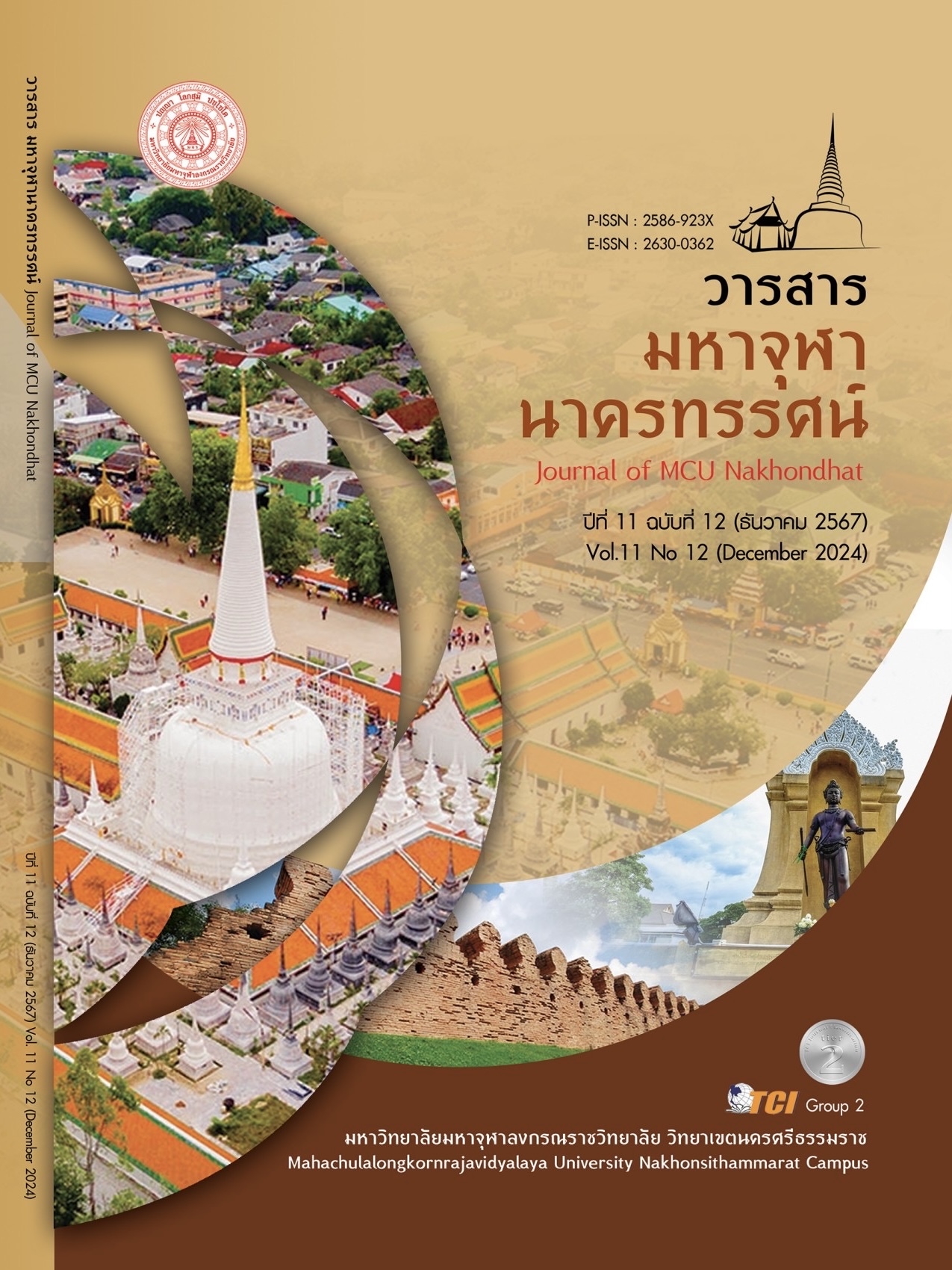A STUDY OF SANGHA ADMINISTRATION ON PUBLIC WELFARE : A CASE STUDY OF BUDDHIST ECCLESIASTICAL OFFICERS IN NAKHON SI THAMMARAT PROVINCE
Main Article Content
Abstract
This research aims to 1) Study the concepts and theories on the administration of the Sangha in public welfare affairs, 2) Study the administration of the Sangha in public welfare affairs by the Sangha leaders, and 3) Analyze the administration of the Sangha in public welfare affairs by the Sangha leaders in Nakhon Si Thammarat Province. This research is a qualitative research using in-depth interviews with 12 people using an interview form as a tool. The theoretical content analysis integrates the results from the interviews. The research results found that 1) The concepts and theories on the administration of the Sangha in public welfare affairs found that the social welfare roles of monks include the roles in education, public affairs, public mental development, mental welfare, local development, and the four regulations of the Sangha Supreme Council: running activities to help and support, helping and supporting others' activities for public benefit, helping and supporting public property, and helping and supporting the general public. 2) The public welfare administration of the Sangha in Nakhon Si Thammarat Province found that the public welfare work of the Sangha carried out various forms of material and mental assistance that did not violate the Dharma and Vinaya. It restored the mental state of Buddhists, was a model for living, had good work planning, and distributed work to cover all areas. 3) The public welfare administration of the Sangha in Nakhon Si Thammarat Province considered the main principles to benefit the community and society, to make the temple a center of learning, to promote community participation activities with a clear plan, by using the "Bor Wor" principle as a model for supporting public property, to have good work planning and management that benefits the community.
Article Details

This work is licensed under a Creative Commons Attribution-NonCommercial-NoDerivatives 4.0 International License.
References
กรมการศาสนา. (2542). คู่มือพระสังฆาธิการว่าด้วยพระราชบัญญัติ กฎระเบียบ และคำสั่งของคณะสงฆ์. กรุงเทพมหานคร: กองแผนงานกรมการศาสนา.
พระราชวิสุทธิกวี. (26 มิถุนายน 2567). การบริหารกิจการคณะสงฆ์ด้านสาธารณะสงเคราะห์ของพระสังฆาธิการในจังหวัดนครศรีธรรมราช. (พระปลัดวิริทธ์พล อายุวฑฺฒโก (จีนแก้วเปี่ยม), ผู้สัมภาษณ์)
เดชชาติ ตรีทรัพย์. (23 มิถุนายน 2567). การบริหารกิจการคณะสงฆ์ด้านสาธารณะสงเคราะห์ของพระสังฆาธิการในจังหวัดนครศรีธรรมราช. (พระปลัดวิริทธ์พล อายุวฑฺฒโก (จีนแก้วเปี่ยม), ผู้สัมภาษณ์)
พระครูบริหารสังฆกิจ. (ทวี กนฺตสีโล). (27 มิถุนายน 2567). การบริหารกิจการคณะสงฆ์ด้านสาธารณะสงเคราะห์ของพระสังฆาธิการในจังหวัดนครศรีธรรมราช. (พระปลัดวิริทธ์พล อายุวฑฺฒโก (จีนแก้วเปี่ยม), ผู้สัมภาษณ์)
พระเทพปริยัติสุธี.(เสรี ธมฺมเวที). (2550). การคณะสงฆ์และการพระศาสนา. พระนครศรีอยุธยา: มหาวิทยาลัยมหาจุฬาลงกรณราชวิทยาลัย.
พระธรรมปริยัติเวที (สุเทพ ผุสฺสธมฺโม). (2548). สารภาค 15. กาญจนบุรี: สำนักพิมพ์ธรรมเมธี.
พระใบฎีกาพงษ์ศักดิ์ ขนฺติพโล และคณะ. (2560). กลยุทธ์การบริหารจัดการด้านสาธารณสงเคราะห์ของพระสังฆาธิการ ในเขตอำเภอเมือง จังหวัดฉะเชิงเทรา. ใน รานงานวิจัย. สถาบันวิจัยพุทธศาสตร์ มหาวิทยาลัยมหาจุฬาลงกรณราชวิทยาลัย.
พระมหากฤษฎา นันทเพชร. (2540). ทัศนคติของพระสงฆ์ต่อบทบาทการพัฒนาสังคม. กรุงเทพมหานคร: สถาบันบัณฑิตพัฒนบริหารศาสตร์.
พระมหาทะนงชัย บูรณพิสุทธิ์. (2545). บทบาทของวัดในเขตชุมชนเมืองในเขตบางรักกรุงเทพมหานคร. ใน วิทยานิพนธ์ศิลปศาสตรมหาบัณฑิต สาขาวิชาพัฒนาชนบทศึกษา. มหาวิทยาลัยมหิดล.
พระมหาพชร กิตฺติวรเมธี (กิติวัฒนวรานนท์). (2565). การพัฒนางานด้านสาธารณสงเคราะห์ตามแผนปฏิรูปกิจการพระพุทธศาสนาของพระสังฆาธิการในจังหวัดสระแก้ว. ใน พุทธศาสตรดุษฎีบัณฑิต สาขาวิชาการจัดการเชิงพุทธ. มหาวิทยาลัยมหาจุฬาลงกรณราชวิทยาลัย.
พระราชบัญญัติคณะสงฆ์ พ.ศ. 2505 (แก้ไขเพิ่มเติมฉบับที่ 3). (2560). ราชกิจจานุเบกษา เล่มที่ 134 ตอนที่ 2 ก หน้า 1 - 6. (6 มกราคม 2560).
พระราชบัญญัติคณะสงฆ์ พ.ศ. 2505. (2505). ราชกิจจานุเบกษา เล่มที่ 134 ตอนที่ 2 ก หน้า 1 - 6. (25 ธันวาคม 2505).
พุทธทาสภิกขุ. (2537). การสังคมสงเคราะห์ส่วนที่ยังขาดอยู่. นนทบุรี: พิมพ์ดี.


